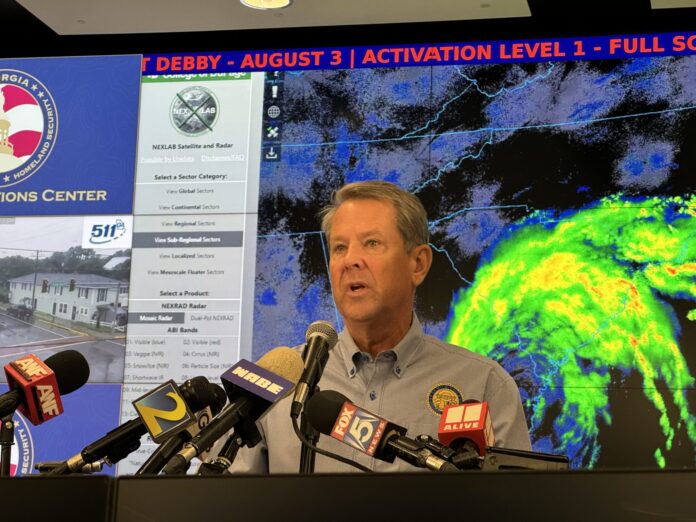
(Georgia Recorder) — Georgia Gov. Brian Kemp urged residents of southeast Georgia to stay vigilant in the coming days as slow-moving Tropical Storm Debby is expected to dump more water on the state.
Already, the storm has claimed the life of one Georgian. A 19-year-old Moultrie man was killed Monday afternoon when a tree fell on his home. There were four other storm-related deaths in Florida.
“The best-case scenario, we’re going to get another four to five inches of rain on top of what we already had,” Kemp said during a press briefing Tuesday morning. “The worst-case scenario, we may have another up to eight inches of rain. So, unfortunately, I don’t believe this storm is done with us yet.”
Will Lanxton, state meteorologist at the Georgia Emergency Management Agency and Homeland Security, said that the worst-case scenario is based on a model that shows the storm potentially stalling off the coast before returning to Georgia Thursday.
But Lanxton said Tuesday that the threat of catastrophic flooding in Georgia had likely passed. He said it’s possible the coast could see rainfall like what occurred during Hurricane Matthew in 2016 when 17 inches drenched Savannah.
“If we do see that storm track farther inland over the next couple of days, we could start to approach that level,” he said. “It wouldn’t be historic, it wouldn’t be catastrophic, but it would be a high-end event.”
Kemp declared a state of emergency Saturday before the storm made landfall Monday in Florida as a Category 1 hurricane. The state operations center was activated over the weekend, and state resources were dispatched to south Georgia.
By Monday, Vice President Kamala Harris, who is the Democratic nominee for president, had postponed her planned rally in Savannah that was part of a swing through battleground states with her newly announced running mate, Minnesota Gov. Tim Walz.
President Joe Biden approved a federal emergency declaration for Georgia Tuesday morning to help with evacuation and shelter.
Kemp said state officials were also monitoring the storm’s impact on crops like cotton, peanuts, pecans and timber.
“We’re just keeping our fingers crossed right now,” Kemp said. “It’s just going to depend on what area they are in, how much rain they’ve gotten, what stage the crop is in, and what kind of wind damage they had.”
Meteorologists have forecasted an especially active hurricane season, which winds down in late November.






